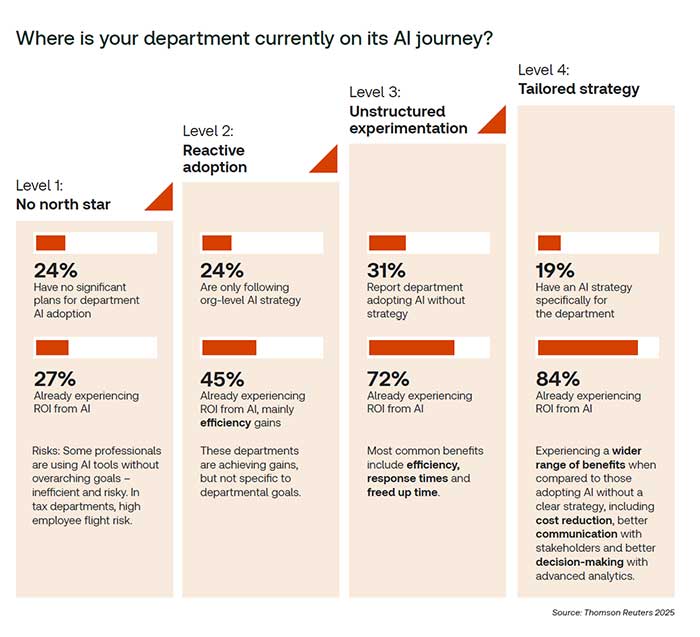Every tech team is obsessed with AI, but when it comes to real-world results it’s the departments handling compliance leading the way.
By Laura Clayton McDonnell
Let’s be honest: corporate tax, trade, accounting, in-house counsel, compliance, and other functional teams that pride themselves on precedent have not traditionally been seen as the hotspots of technological innovation. That’s all changing in the era of generative and agentic AI. Thanks to rapid advancements in areas like legal research and drafting, tax determination, and risk and compliance monitoring, these corporate enabling functions are now at the forefront of corporate AI adoption.

The phenomenon mainly results from several trends coming together. The most notable is that these once-staid corporate functions have become increasingly vital to core business operations, driven by rising regulatory uncertainty and administrative complexity. At the same time, budgets are tighter than ever, and talent shortages are widespread. Recent Thomson Reuters research shows that 62% of employees in corporate legal departments feel they lack enough time to complete all their tasks. This combination of rising demand and shrinking resources creates an ideal environment for any new innovation that can save time and money.
Then, there is the nature of the work itself. Corporate tax, legal, risk and governance, global trade, and compliance functions are highly data-intensive jobs, where success is often judged by one’s ability to absorb and interpret large amounts of information to help businesses anticipate and prevent problems before they happen. At their core, these are information processing roles that require finding the needles in the haystack repeatedly. This, of course, is where AI shines. It is no accident that some of the earliest successful proofs of concept for generative AI involved tests like the LSAT and the CPA exam.
Accordingly, much of the AI-driven product development in recent years, including that at Thomson Reuters, has focused on creating highly specialized, professional-grade AI models based on authoritative case law, tax policy, and regulatory information curated by attorneys and CPAs. This has been a crucial factor that has enabled corporate legal, tax, and other enabling functions to effectively adopt AI. Unlike generalist AI models that are prone to hallucinations and misinterpretation of specialized data, these professional-grade AI tools are built using the same source material that these professionals have depended on for decades to perform their work. Now it is supercharged, taking work that used to take hours down to just minutes.
The overall impact of these developments has been that in-house lawyers, accountants, and risk and compliance professionals have unintentionally become the leaders of AI adoption within their organizations. Suddenly, these departments that were once known as “the departments of no” are setting the standard for successful enterprise AI integration. Routinely using AI-powered tools to perform tax and legal research, draft documents, identify anomalies, optimize spending, and collaborate with colleagues, these teams are already demonstrating how smooth AI integration can genuinely revolutionize businesses from the inside out.

Perhaps that’s why 81% of corporate legal, tax, compliance, and global trade professionals surveyed in our recent Future of Professionals Report 2025 believe AI will have a high or transformative impact on their field within the next five years. Moreover, 54% say their companies are already seeing at least one benefit from AI adoption, and 55% say they have invested in new AI tools in the past 12 months.
That’s a big deal when you consider that the first publicly available generative AI tools became accessible less than three years ago, and professional-grade AI solutions using generative and agentic AI designed specifically for corporate tax, legal, compliance, and global trade functions are still relatively new. The pace of adoption and widespread use of these solutions within these corporate departments rivals that of any technology before, from the fax machine to the internet to the iPhone.

The natural question then becomes: what’s next? In a world where some of the most detail-obsessed, risk-averse professionals are leading the way in adopting new technology, expectations for AI-powered solutions are rising sharply. Generalist applications that lack authoritative source information will not be accepted. Black box models that do not clearly explain their logic and provide detailed citations will also fail. To meet the standards set by these early adopters, all new AI solutions aiming to compete in the corporate world must withstand rigorous scrutiny.
In becoming the tip of the spear in corporate AI innovation, these pioneering legal, tax and accounting, risk and compliance, and global trade teams are helping to shape the future of professional-grade AI in their own image. Detail-obsession, rigorous scrutiny, and bulletproof reliability are some of the key qualities that will be essential for the future of corporate AI adoption, thanks to the contributions from these newly established corporate innovators.

About the Author
Laura A. Clayton McDonnell is the President of the Corporates business segment at Thomson Reuters, focused on customer and cultural transformation, driving positive results, growing market share, and developing high performance teams. She has extensive sales management and legal experience and has held executive-level positions at leading companies in the high technology industry including ServiceNow; Microsoft; Aspect Software; IBM; Rational Software; and various senior sales and legal roles at Sun Microsystems, Cisco and Apple. Prior to making the jump to corporate America, Laura was in private corporate and securities law practice.
Laura has been honoured many times for her work including as the 2022 Top 100 Global Sales Leader, sponsored by The Modern Sale and Collective[i]; and as a recipient of the 2008 YWCA Silicon Valley Tribute to Women Award. She is an avid champion of women and is a member of the Advisory Council of the Center for Equity, Gender and Leadership, University of California at Berkeley and is a member of the Women’s Forum of New York. Laura serves on the board of directors of Signal AI, a private company, which provides insights for entities from data collected from traditional and social media.
Laura received a Bachelor of Science degree “with distinction” from San Jose State University, and a JD-MBA joint degree, from the University of California, at Berkeley. Laura is licensed to practice law in the District of Columbia and the State of California.
Scott Ellyson, CEO of East West Manufacturing, brings decades of global manufacturing and supply chain leadership to the conversation. In this episode, he shares practical insights on scaling operations, navigating complexity, and building resilient manufacturing networks in an increasingly connected world.